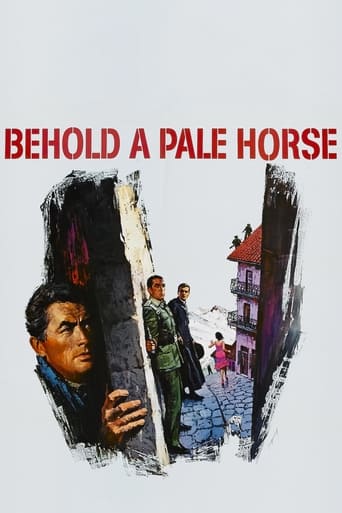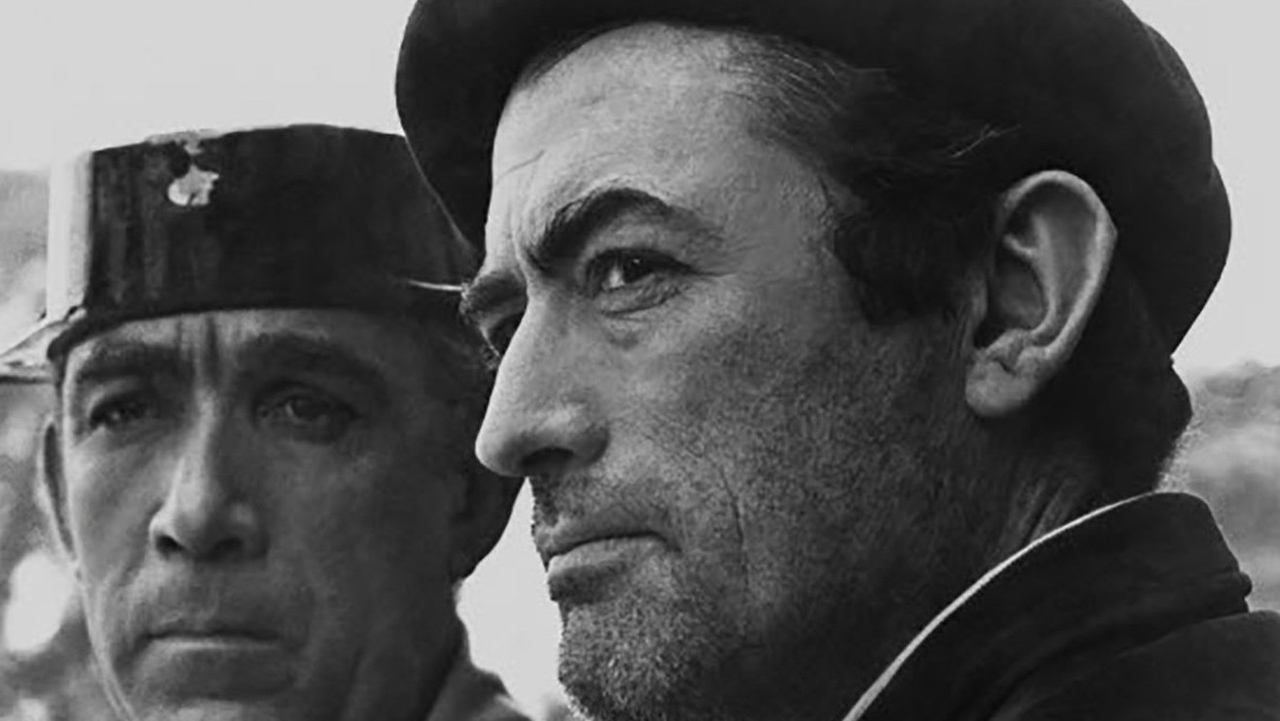tieman64
In the early 1930s, Spain kicked out its monarchs and attempted to form a "democratic Republic". As is common in history, the leftist government which ousted the monarchy didn't last long. A coalition of centre right and far right parties, fascists, monarchists, the Catholic Church, European and Western powers and eventually dictator Francisco Franco, crushed the rag-tag assembly of leftists and took power themselves. Franco himself would rule from 1933 to 1973. He received tacit support from the French and British establishment, who preferred fascism over socialism. Deeply demented, Franco rallied people to his cause under the guise of removing a "threatening infestation" of "Jews", "Marxists" and "Masons". Anyone who violently opposed his rule was deemed a "terrorist" or "anarchist".Fred Zinnemann's "Behold a Pale Horse" deals with one such "terrorist". He is Manuel Artiguez (Gregory Peck). The Spanish Civil War has ended, but Artiguez is still in hiding. His arch nemesis is Vinolas (Anthony Quinn), a police captain whom Artiguez fought during the War. After decades of separation, the duo's feud is about to be reignited."Horse" opens with Artiguez learning that his mother has been hospitalised. Vinolas, knowing that Artiquez will visit his mother, erects a trap to catch his prey; the entire town of Saint Martin, where Artiquez's mother is housed, is now crawling with hidden solders, snipers and Vinolas himself. When Artiguez arrives, he will be killed. Artiguez knows this. He goes anyway.Ambitious political thrillers (Costa Gavras, Pontecorvo, Martin Ritt etc) were the norm in the 1960s. Zinnemann's film itself strives for both greatness and complexity. Unfortunately, it can't quite get there. "Horse" drags badly at times, Gregory Peck is as wooden as ever, and the film's climax lacks a few minutes of extra thrills. Still, there's much to admire. Zinnemann's procedural-like tone is gripping and the film climaxes with an impressive sequence. Zinnemann's location photography, cinematography and script are also fine, and the film's plot is intrinsically pregnant with tension.But it's on the level of allegory that "Behold a Pale Horse" works best. For most of the film, we're unsure whether Artiguez is driven by honour, revenge, sheer stubbornness, political ideals or a suicidal urge for death. It is only in "Horse's" last act that things become somewhat clearer. Here Artiguez spares Vinolas' life and instead kills a friend who has turned traitor. This traitor's breaking of his word, his pledge of honour, is mirrored to the actions of a young priest (Omar Sharif), who risks life and limb to abide by a promise made to a dying woman. Climaxing with Artiguez dead and his body riddled with bullets, "Horse" offers, not only Spanish Republicans as being forever tainted by the failure of defeat, but the Civil War itself as being compromised by betrayal and traitors; men who'd sell out their fellow-men for status and lucre. "In the most mean, cowardly, hypocritical way the British ruling class did all they could to hand Spain over to Franco!" George Orwell once wrote. But such a "selling out" applied to whole swathes of society – the ruling class and the ruled - even within Spain herself.Hollywood largely avoided films set during or immediately after the Spanish Civil War. Three of the more famous ones were "Blockade" (1938), "For Whom the Bell Tolls" (1943) and "Behold a Pale Horse". "For Whom the Bell Tolls", of course, was based on the 1940 novel by Ernest Hemingway. Hemingway would criticise the film for eschewing the political complexity of the war and ignoring the motivations and ideals of its participants. In an infamous rant about the film, which criticised it for containing not a single reference to "fascism", "falangism", "demoracy", "socialism", "communism" or "anarchism", Hemingway would say: "Why not use the word Fascists? We are at present engaged in fighting a war against the Fascists. Throughout the picture the enemy should be called the Fascists and the Republic should be called the Republic!" Released two decades after "For Whom the Bell Tolls", "Behold a Pale Horse" is similarly petrified of offending. Who and what its characters "really are" and "really represent" remains tactically vague, and history is carefully obfuscated. As a result, "Horse" could take place almost anywhere and anyplace. This allows the film to work well as a noirish, revenge thriller, but Zinnemann's aesthetic - slow and serious - clearly has other intentions, intentions which the film's actual content betrays.7.5/10 - See "The Spy Who Came In From The Cold" for this material handled better.
Jay Raskin
This movie reminded me a bit of "The Third Man," where there are a lot of street scenes that lead you places you do not expect. It is not nearly as brilliant or satisfying as "The Third Man," but it is interesting and surprising. The biggest surprise is the intensity of Gregory Peck as guerrilla leader Manuel Artiguez. He is a defeated Spanish Partisan who has continued to fight for twenty years after the Spanish Civil War ended. Peck slowly realizes that his importance as a symbol of resistance is more important than his life, and his only chance for victory.Omar Sheriff and Anthony Quinn are fine as a priest and police chief, but their characters are pretty straightforward. It was interesting to watch Quinn prayer to God to help him catch Artiquez. Usually antagonists get to kick a dog so that the audience knows that hes the bad guy. Here the director Fred Zinnemann doesn't stack the deck and allows the audience to decide who is morally right or wrong. A director who treats his audience with respect and assumes they are intelligent, is quite unusual and should be treasured.The only thing I didn't like about the movie was the cinematography. It was sometimes underexposed and muddy. Back in the film days, there would be a final timed print, with each scene getting its own exposure based on its density. It seems as if the print was not timed, or not timed well.Also, the viewer should be warned that there is very little action in the film. The movie focuses on the psychology of the characters, so don't expect "the Guns of Navarone."
MartinHafer
Wow, this film has some odd casting. Although the people in the film are supposed to be Spanish, none of the major actors in the film are from Spain. The weirdest casting was Gregory Peck. Gregory Peck?! At least Anthony Quinn kinda looks Spanish (heck, he's played just about every nationality there is plus half his background is Mexican). And having Muslim-convert Omar Sharif playing a Spanish Catholic priest...! All this is really strange and it's a shame they didn't let any Spaniards play these roles. Now part of this could be because Franco did NOT like the film and probably wouldn't have allowed anyone living in Spain to be in the film. But surely there must have been some expatriates or at least people who seemed more Spanish than Gregory Peck. He was a wonderful actor, certainly, but here he was badly miscast...as was Sharif.The film begins with a quick summary of the Spanish Civil War in the 1930s. At the end, when the Republican forces lost, the surviving fighters are shown turning in their arms and immigrating to France. However, Peck's character refuses to give up the fight and apparently spent the next 20 years making violent incursions into his native land. For this, he is now a wanted criminal--not just an ex-Republican soldier.Now, after 20 years, Peck is living in France and his mother back in Spain is dying. Police chief Quinn now plans to use this approaching death as a chance to lure Peck into a trap. Now considering that Peck has killed and robbed rather senselessly since the war ended, he does deserve to be captured, so in some ways you actually are rooting for the Fascist police to capture him. An interesting twist, as Americans in general were pro-Republican (or ambivalent).The problem is that when Peck doesn't fall into the trap right away AND his mother dies, Quinn needs to keep this a secret--otherwise the plan will come to nothing. But, unknown to Quinn, young priest Sharif has inexplicably agreed to take a message to Peck from his mother in the hospital that warns him of the trap. Now considering that the woman had refused the last rights and cursed God, it is confusing why a priest (and they were mostly pro-Nationalist/Franco) would take the trouble or risk to help. This is, by far, the biggest flaw with the film. His motivation for this was confusing--helping an Atheist to send a message to her Atheist son who is a wanted criminal and killer. Plus, what if priest-hating Peck just decides to kill him?!As far as Peck goes, as least his role is interesting. He is not sympathetic (considering his post-war record) and he's incredibly nasty at times to the young boy in the film. He slaps the kid and tells him to get lost. This is NOT Atticus Finch (TO KILL A MOCKING BIRD) or Ezra Baxter (THE YEARLING)!! I can commend Peck for being willing to play such an unlikable guy. And, the film is interesting in how it takes this child's hero-worship of Peck and quickly erodes it.The problem is, for many, with the Franco government (they're bad, m'kay?!) and a violent criminal who lost sight of his once commendable cause, you are left wondering who to root for in the film. For some, this isn't a problem and for others, like myself, I really didn't care about the characters so I was left feeling disconnected and ambivalent.Now it is well made and well directed, but it's still a film I'd rather have not seen. With so many films out there, I could have easily done better.
Ethan Delaram (luckyethan18)
I get surprise when see that only a few people see this film because I think that it is one of the best zinnemann film.The story which is about alone man that is far from of best years of his life and right now is desolate and subsist in very hard condition(spiritual)is so nice.Peck,Quinn and Sharif all are in their best. Scene that vinolas(Quinn)pray in church is unforgettable.



 AD
AD



